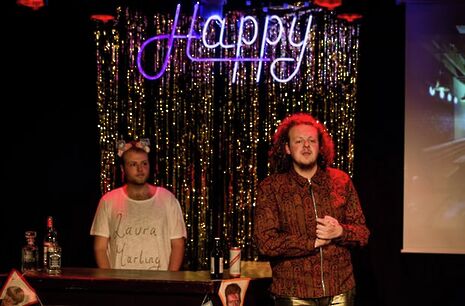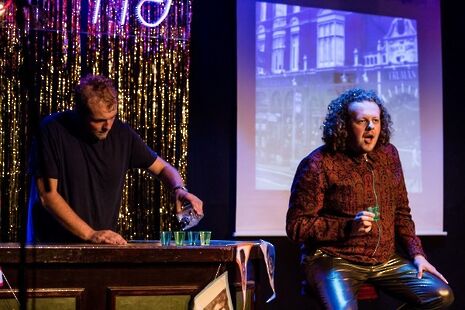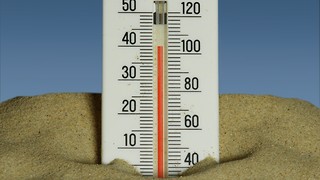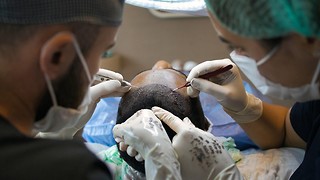Review: Jack Rooke’s Happy Hour at the Fringe
‘Hard-hitting’ – Grace Robinson is bowled over by this witty and poignant ‘celebration of male friendship and of a life’

A can of Red Stripe erupting over his naked torso, a face framed by unruly curls and a glittering gold backdrop, Jack Rooke’s leering grin says nothing if not “let’s get pissed.” That is, on the flyer for his latest theatrical effort, Happy Hour, which made it’s debut at the Edinburgh Fringe this summer.
The flyer “invites you on a pub crawl to end all pub crawls” and so, as first-time Fringe goers completely overwhelmed by the variety of choice on offer, my friends and I decided to take a chance and tag along to Rooke’s Happy Hour. For us, current and ex-students alike, who all love a bev or three, Rooke’s booze-orientated show based in a seedy pub-like setting sounded to us like just the tonic at 17:20 on a Friday night.
The performance begins and Rooke, against a backdrop of shimmering streamers and a neon ‘Happy Hour’ sign, takes his place centre stage. After a few light jokes about lousy jobs he worked as a student, he turns to his stage manager: “Let’s do the death roll-call, Ben.” One by one, Ben places framed portraits in a line as Rooke informs the audience what each person in the portrait meant to him, and how they died. His cat, his dad, his nan. A few awkward titters begin to arise from the crowd as everyone awaits a punch-line that never comes. I was confused – I thought this was a comedy show?
It turns out it was, but it was also so much more. Once the “roll call” is finished, Rooke takes a seat onstage and begins to speak to the audience in the second person, a ‘you’ that at once makes us feel close to Rooke, whilst realising that he is addressing something much bigger.
“The journey is a hilarious one, and Rooke renders the audience doubled up as he recounts anecdotes of cringe-worthy gay-bar encounters and experiences dabbling in cocaine”
He takes us through the whole performance by way of this one-sided discourse addressing the absent yet ever-present ‘you’, leading us through the three years he spent studying journalism at Westminster University. The journey is a hilarious one, and Rooke renders the audience doubled up as he recounts anecdotes of cringe-worthy gay bar encounters and experiences dabbling in cocaine, and as himself and stage manager Ben (revealed to in fact be his close friend) frolic around the crowd in what can only be said to be an ‘attempt’ at dancing.

It’s not always plain sailing, however, as Rooke reveals that along the way he lost a friend to suicide, and the multi-media element of the show allows us to watch another pal of Rooke’s (the eloquently-named ‘cunty Jordan’) read aloud a letter that he wrote to their deceased friend. The video is heart-wrenching to watch, yet the minute the screen fades to black Rooke steps in with a quip that lightens the mood and puts his audience at ease, a quintessential example of the skilful balance he draws between solemnity and humour.
As the performance unfurls, we discover more and more about Rooke’s unknown addressee. ‘You’ are Rooke’s partner in crime, his brother from another mother. ‘You’ help him when he realises he thinks he’s gay. ‘You’ spend your evenings crawling around London’s happy hours together, enjoying cheap drinks and heart-to-hearts. ‘You’ lose contact with Rooke somewhat when you graduate, and whenever ‘you’ get in touch it becomes clear that your mental health is increasingly suffering and the constant modification of your medication is not helping.
And so, the gravity of the performance slowly dawns on the audience, and, as Ben places the final frame into the line, Rooke reveals, choked, that ‘you’ are his best friend, Olly, who committed suicide two years ago.
Rooke concludes his Happy Hour with an honest, open recollection of the events surrounding Olly’s death. He talks of his refusal to learn by what means Olly took his life, because ultimately the ‘how’ is irrelevant compared to the ‘why’. He talks of the shame he felt, since he is an ambassador for a male suicide prevention charity called CALM, and his own best friend took his life.
And finally, he delivers a hard-hitting speech berating the current government for their heinous lack of support of mental health issues in this country, declaring that “the time for talking about mental health is over” and punching the audience in the chest with every passionate chant of the word “failure.”
“The ironically but fittingly-named Happy Hour is not a melancholy piece of theatre about a suicide – it is a celebration of male friendship and of a life”
After the show, Rooke collected donations for his charity, CALM, from audience members as we left the theatre, and after making our contribution one of my companions turned to me and said “my god, my heart aches.” And that’s it. That is the only way to sum up the tumult of emotions that Rooke conjures up through his performance.
The ironically but fittingly-named Happy Hour is not a melancholy piece of theatre about a suicide – it is a celebration of male friendship and of a life, whose farcical aspects only increase the weight of its overarching message: mental health is a still a massive f***ing problem. And we need to start addressing it
 Features / Meet the Cambridge students whose names live up to their degree9 September 2025
Features / Meet the Cambridge students whose names live up to their degree9 September 2025 News / Student group condemns Biomedical Campus for ‘endorsing pseudoscience’10 September 2025
News / Student group condemns Biomedical Campus for ‘endorsing pseudoscience’10 September 2025 News / Tompkins Table 2025: Trinity widens gap on Christ’s19 August 2025
News / Tompkins Table 2025: Trinity widens gap on Christ’s19 August 2025 Science / Who gets to stay cool in Cambridge?7 September 2025
Science / Who gets to stay cool in Cambridge?7 September 2025 News / New left-wing student society claims Corbyn support11 September 2025
News / New left-wing student society claims Corbyn support11 September 2025








